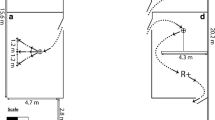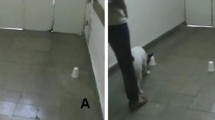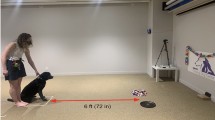Abstract
Inhibitory control is a term used to envelop a collection of processes that allow an organism to refrain from engaging in an inappropriate prepotent or responsive behavior. Studies have examined the propensity of inhibitory control by nonhuman animals, from the cognitively complex processes involved in self-control to potentially less cognitively taxing processes such as motoric self-regulation. Focusing on canines, research has suggested that the domestication process as well as experiences during ontogeny contribute to inhibitory control. Diet may also play an important role in an individual’s ability to self-regulate. This study examined this possibility by investigating motoric self-regulation in sled dogs, using three well-established tasks (i.e., A-not-B Bucket, Cylinder, and A-not-B Barrier tasks), performed after consumption of one of three dietary treatments with different glycemic index values. We also compared the performance of sled dogs during these tasks with results previously obtained from pet dogs. Overall, the results show many similarities in the performance of sled dogs and pet dogs on the motoric self-regulation tasks, with the notable exception that sled dogs may have a stronger spatial perseveration during the A-not-B Bucket task. Previous research findings reporting a lack of correlation among these tasks are also supported. Finally, during the early postprandial phase (period after consumption), dietary treatments with different glycemic index values did not influence self-regulatory performance for sled dogs.



Similar content being viewed by others
References
Adolphe JL, Drew MD, Huang Q, Silver TI, Weber LP (2012) Postprandial impairment of flow-mediated dilation and elevated methylglyoxal after simple but not complex carbohydrate consumption in dogs. Nutr Res 32(4):278–284. https://doi.org/10.1016/j.nutres.2012.03.002
Adolphe J, Silver T, Childs H, Drew M, Weber L (2014) Short-term obesity results in detrimental metabolic and cardiovascular changes that may not be reversed with weight loss in an obese dog model. Brit J Nutr 112(4):647–656. https://doi.org/10.1017/S0007114514001214
Amici F, Aureli F, Call J (2008) Fission-fusion dynamics, behavioral flexibility, and inhibitory control in primates. Curr Biol 18(18):1415–1419. https://doi.org/10.1016/j.cub.2008.08.020
Atkinson FS, Foster-Powell K, Brand-Miller JC (2008) International tables of glycemic index and glycemic load values: 2008. Diabetes Care 31(12):2281–2283. https://doi.org/10.2337/dc08-1239
Axelsson E, Ratnakumar A, Arendt ML, Maqbool K, Webster MT, Perloski M et al (2013) The genomic signature of dog domestication reveals adaptation to a starch-rich diet. Nature 495(7441):360–364. https://doi.org/10.1038/nature11837
Barclay AW, Petocz P, McMillan-Price J, Flood VM, Prvan T, Mitchell P, Brand-Miller JC (2008) Glycemic index, glycemic load, and chronic disease risk—a meta-analysis of observational studies. Am J Clin Nutr 87(3):627–637. https://doi.org/10.1093/ajcn/87.3.627
Barrera G, Alterisio A, Scandurra A, Bentosela M, D’Aniello B (2018) Training improves inhibitory control in water rescue dogs. Anim Cogn 22(1):127–131. https://doi.org/10.1007/s10071-018-1224-9
Bates D, Maechler M, Bolker B, Walker S (2015) Fitting linear mixed-effects models using lme4. J Stat Soft 67(1):1–48. https://doi.org/10.18637/jss.v067.i01
Benton D, Ruffin M, Lassel T, Nabb S, Messaoudi M, Vinoy S et al (2003) The delivery rate of dietary carbohydrates affects cognitive performance in both rats and humans. Psychopharm 166(1):86–90. https://doi.org/10.1007/s00213-002-1334-5
Beran MJ (2015) The comparative science of “self-control”: what are we talking about? Front Psychol 6:51. https://doi.org/10.3389/fpsyg.2015.00051
Beurms S, Miller HC (2016) Sharing more than the sofa: what dogs can teach us about human self-control. Curr Dir Psychol Sci 25(5):351–356. https://doi.org/10.1177/0963721416664392
Bray E, MacLean E, Hare B (2014) Context specificity of inhibitory control in dogs. Anim Cogn 17(1):15–31. https://doi.org/10.1007/s10071-013-0633-z
Bray E, MacLean E, Hare B (2015) Increasing arousal enhances inhibitory control in calm but not excitable dogs. Anim Cogn 18(6):1317–1329. https://doi.org/10.1007/s10071-015-0901-1
Brucks D, Marshall-Pescini S, Wallis L, Huber L, Range F (2017) Measures of dogs’ inhibitory control abilities do not correlate across tasks. Front Psychol 8:849. https://doi.org/10.3389/fpsyg.2017.00849
Carciofi AC, Takakura FS, de Oliveira LD et al (2008) Effects of six carbohydrate sources on dog diet digestibility and post-prandial glucose and insulin response. J Anim Physiol Anim Nutr 92(3):326–336. https://doi.org/10.1111/j.1439-0396.2007.00794.x
Davis MS, Geor RJ, Williamson KK (2018) Effect of endurance conditioning on nsulin-mediated glucose clearance in dogs. Med Sci Sports Exerc 50:2494–2499
Diamond A (1990) Developmental time course in human infants and infant monkeys, and the neural bases of, inhibitory control in reaching. Ann N Y Acad Sci 608:637–669
Fagnani J, Barrera G, Carballo F, Bentosela M (2016) Is previous experience important for inhibitory control? A comparison between shelter and pet dogs in A-not-B and cylinder tasks. Anim Cogn 19(6):1165–1172. https://doi.org/10.1007/s10071-016-1024-z
Flint R, Turek C (2003) Glucose effects on a continuous performance test of attention in adults. Behav Brain Res 142(1–2):217–228. https://doi.org/10.1016/S0166-4328(03)00002-0
Glady Y, Genty E, Roeder J (2012) Brown Lemus (Eulemus fulvus) can master the qualitative version of the reverse-reward contingency. PLoS One 7(10):1–7. https://doi.org/10.1371/jounal.pone.0048378
Graham PA, Maskell IE, Nash AS (1994) Canned high fiber diet and postprandial glycemia in dogs with naturally occurring diabetes mellitus. J Nutr 124(12 Suppl):2712S–2715S. https://doi.org/10.1093/jn/124.suppl_12.2712S
Hall JA, Melendez LD, Jewell DE, Kaltenboeck B (2013) Using gross energy improves metabolizable energy predictive equations for pet foods whereas undigested protein and fiber content predict stool quality. PLoS ONE 8(1):e54405
Jenkins DJ, Wolever TM, Taylor RH, Barker H, Fielden H, Baldwin JM et al (1981) Glycemic index of foods: a physiological basis for carbohydrate exchange. Am J Clin Nutr 34(3):362–366. https://doi.org/10.1093/ajcn/34.3.362
Kabadayi C, Taylor LA, von Bayern AM, Osvath M (2016) Ravens, New Caledonian crows and jackdaws parallel great apes in motor self-regulation despite smaller brains. R Soc Open Sci 3(4):160104. https://doi.org/10.1098/rsos.160104
Kabadayi C, Bobrowicz K, Osvath M (2018) The detour paradigm in animal cognition. Anim Cogn 21(1):21–35. https://doi.org/10.1007/s10071-017-1152-0
Kawano H, Motoyama T, Hirashima O, Hirai N, Miyao Y, Sakamoto T et al (1999) Hyperglycemia rapidly suppresses flow-mediated endothelium-dependent vasodilation of brachial artery. J Am Coll Cardiol 34(1):146–154
Laflamme D (1997) Development and validation of a body score system for dogs. Canine Pract 22(4):10–15
Lamport DJ, Lawton CL, Mansfield MW, Dye L (2009) Impairments in glucose tolerance can have a negative impact on cognitive function: a systematic research review. Neurosci Biobehav Rev 33(3):394–413. https://doi.org/10.1016/j.neubiorev.2008.10.008
Lamport DJ, Hoyle E, Lawton CL, Mansfield MW, Dye L (2011) Evidence for a second meal cognitive effect: glycaemic responses to high and low glycaemic index evening meals are associated with cognition the following morning. Nutr Neurosci 14(2):66–71. https://doi.org/10.1179/1476830511Y.0000000002
Lucon-Xiccato T, Gatto E, Bisazza A (2017) Fish perform like mammals and birds in inhibitory motor control tasks. Sci Rep 7(1):13144. https://doi.org/10.1038/s41598-017-13447-4
MacLean EL, Hare B, Nunn CL, Addessi E, Amici F, Anderson RC et al (2014) The evolution of self-control. Proc Natl Acad Sci USA 111(20):E2140–E2148. https://doi.org/10.1073/pnas.1323533111
Marshall-Pescini S, Viranyi Z, Range F (2015) The effect of domestication on inhibitory control: wolves and dogs compared. PLoS One 10(2):e0118469. https://doi.org/10.1371/journal.pone.0118469
McCance RA, Lawrence RD (1929) The carbohydrate content of foods. Lancet 213(5520):1264–1265
McNay EC, Fries TM, Gold PE (2000) Decreases in rat extracellular hippocampal glucose concentration associated with cognitive demand during a spatial task. Proc Natl Acad Sci USA 97(6):2881–2885. https://doi.org/10.1073/pnas.050583697
Miller HC, Pattison KF, DeWall CN, Rayburn-Reeves R, Zentall TR (2010) Self-control without a “self”? Common self-control process in humans and dogs. Psych Sci 21(4):534–538. https://doi.org/10.1177/0956797610364968
Miller HC, Pattison KF, Laude JR, Zentall TR (2015) Self-regulatory depletion in dogs: insulin release is not necessary for the replenishment of persistence. Behav Processes, 110:22–26. https://www.ncbi.nlm.nih.gov/pubmed/25264236. https://doi.org/10.1016/j.beproc.2014.09.030
Node K, Inoue T (2009) Postprandial hyperglycemia as an etiological factor in vascular failure. Cardiovasc Diabetol 8:23. https://doi.org/10.1186/1475-2840-8-23
Parrish AE, Emerson ID, Rossettie MS, Beran MJ (2016) Testing the glucose hypothesis among capuchin monkeys: Does glucose boost self-control? Behav Sci (Basel) 6(3):16. https://doi.org/10.3390/bs6030016
Philippou E, Constantinou M (2014) The influence of glycemic index on cognitive functioning: a systematic review of the evidence. Adv Nutr 5(2):119–130. https://doi.org/10.3945/an.113.004960
Piotti P, Satchell L, Lockhart T (2018) Impulsivity and behaviour problems in dogs: a reinforcement sensitivity theory perspective. Behav Processes 151:104–110. https://doi.org/10.1016/j.beproc.2018.03.012
Rankovic A (2018) The acute effects of starch sources on glycemic index, glycemic response, insulinemic response and satiety-related hormones in dogs. Master’s thesis dissertation, University of Guelph, Guelph, Canada
Riby LM, Lai Teik Ong D, Azmie NBM, Ooi EL, Regina C, Yeo EKW et al (2017) Impulsiveness, postprandial blood glucose, and glucoregulation affect measures of behavioral flexibility. Nutr Res 48:65–75. https://doi.org/10.1016/j.nutres.2017.10.011
Ryan CM, van Duinkerken E, Rosano C (2016) Neurocognitive consequences of diabetes. Am Psychol 71(7):563–576. https://doi.org/10.1037/a0040455
Salman MD, Hutchison J, Ruch-Gallie R, Kogan L, New JC, Kaas PH, Scarlett JM (2000) Behavioral reasons for relinquishment of dogs and cats to 12 shelters. J Appl Anim Welf Sci 3(2):93–106. https://doi.org/10.1207/S15327604JAWS0302_2
Santos L, Ericson B, Hauser M (1999) Constraints on problem solving and inhibition: object retrieval in cotton-top tamarins (Saguinus oedipus oedipus). J Comp Psychol 113(2):186–193. https://doi.org/10.1037/0735-7036.113.2.186
Schnurr TM, Reynolds AJ, Gustafson SJ, Duffy LK, Dunlap KL (2014) Conditioning causes an increase in glucose transporter-4 levels in mononuclear cells in sled dogs. Int J Biochem Cell Biol 55:227–231
Smith MA, Riby LM, Eekelen JA, Foster JK (2011) Glucose enhancement of human memory: a comprehensive research review of the glucose memory facilitation effect. Neurosci Biobehav Rev 35(3):770–783. https://doi.org/10.1016/j.neubiorev.2010.09.008
Stow MK, Vernouillet A, Kelly DM (2018) Neophobia does not account for motoric self-regulation performance as measured during the detour-reaching cylinder task. Anim Cogn 21(4):565–574. https://doi.org/10.1007/s10071-018-1189-8
Sümegi Z, Kis A, Miklosi A, Topal J (2014) Why do adult dogs (Canis familiaris) commit the A-not-B search error? J Comp Psychol 128(1):21–30. https://doi.org/10.1037/a0033084
Sunvold GD, Bouchard GB (1998) The glycemic response to dietary starch. In: Reinhart GA, Carey DP (eds) Recent advances in canine and feline nutrition: iams nutrition symposium proceedings, vol II. Orange Frazer Press, Wilmington
Thomas DE, Elliott EJ, Baur L (2007) Low glycaemic index or low glycaemic load diets for overweight and obesity. Cochrane Database Syst Rev. https://doi.org/10.1002/14651858.cd005105.pub2
Vernouillet A, Anderson J, Clary D, Kelly DM (2016) Inhibition in Clark’s nutcrackers (Nucifraga columbiana): results of a detour-reaching test. Anim Cogn 19(3):661–665. https://doi.org/10.1007/s10071-016-0952-y
Vernouillet A, Stiles LR, Andrew McCausland J, Kelly DM (2018) Individual performance across motoric self-regulation tasks are not correlated for pet dogs. Learn Behav 46(4):522–536. https://doi.org/10.3758/s13420-018-0354-x
Wascher TC, Schmoelzer I, Wiegratz A, Stuehlinger M, Mueller-Wieland D, Kotzka J, Enderle M (2005) Reduction of postchallenge hyperglycaemia prevents acute endothelial dysfunction in subjects with impaired glucose tolerance. Eur J Clin Invest 35(9):551–557. https://doi.org/10.1111/j.1365-2362.2005.01550.x
Wiedmeyer CE, Johnson PJ, Cohn LA, Meadows RL (2003) Evaluation of a continuous glucose monitoring system for use in dogs, cats, and horses. J Am Vet Med Assoc 223(7):987–992
Wolever TMS, Jenkins DJA, Jenkins AL, Josse RG (1991) The glycemic index: methodology and clinical implications. Am J Clin Nutr 54(5):846–854
Acknowledgments
We would very much like to thank the owner’s of the sled dogs for lending us the facilities and access to their sled dogs to perform our experiments. We would like to thank Laura Stiles for assistance with data scoring. AdV, DMK, JA designed the study; DMK, AlV and JAM conducted the behavioral experiments; AdV, JA, AR designed the nutritional components, AlV and DMK analyzed the data, and all authors contributed to writing and editing the manuscript.
Funding
This study was funded by a Natural Science & Engineering Research Council Collaborative Research Development grant (#CRDPJ488705–15) in partnership with Petcurean Pet Nutrition to AdV, DMK and JA. JA is an employee with Petcurean Pet Nutrition.
Author information
Authors and Affiliations
Corresponding author
Ethics declarations
Conflict of interest
Authors AdV, DMK and JA received funding by a Natural Science & Engineering Research Council Collaborative Research Development grant (#CRDPJ488705–15) in partnership with Petcurean Pet Nutrition to JA, who is an employee with Petcurean Pet Nutrition. Authors AdV, DMK and JA declare that they have no conflict of interest.
Ethical approval
All applicable international, national, and/or institutional guidelines for the care and use of animals were followed.
Additional information
Publisher's Note
Springer Nature remains neutral with regard to jurisdictional claims in published maps and institutional affiliations.
Electronic supplementary material
Below is the link to the electronic supplementary material.
Rights and permissions
About this article
Cite this article
Kelly, D.M., Adolphe, J.L., Vernouillet, A. et al. Motoric self-regulation by sled dogs and pet dogs and the acute effect of carbohydrate source in sled dogs. Anim Cogn 22, 931–946 (2019). https://doi.org/10.1007/s10071-019-01285-y
Received:
Revised:
Accepted:
Published:
Issue Date:
DOI: https://doi.org/10.1007/s10071-019-01285-y




